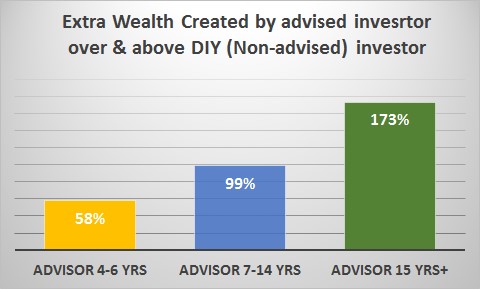Warren Buffett hit the nail on the head with his comment about investing mistakes: “To succeed in investing, you need to do very few correct things unless you do too many wrong things”.
In investing, mistakes drag your portfolio down at a very fast rate and it takes lot of correct moves to get it back on track. If you see the recent track record of continuing SIPs published by AMFI, you will be surprised that as against the 19% advised investors (invested via regular plan) who continued their SIPs for more than 5 years, only 9% of direct plan investors continued their SIPs for the same period. What is the reason for this gap? Why are advised investors twice as likely to continue wealth creation compared to DIY investors?
The reason is simple. It’s not the cheaper funds or good funds that make the money, it’s investment advice and education that make the difference. Robert Kiyosaki, author of Rich Dad Poor Dad, said that the lack of financial education is the key reason that separates the rich from poor. Does it really mean that advised (regular plan) investors are likely to amass more wealth in the longer run? The answer is a big ‘yes’.
A study by Vanguard – Vanguard Advisor’s Alpha outlines how advisors can add value by providing relationship-oriented services. Here are the results of its findings:
- Portfolio construction and asset allocation: 0.45-1.20 %
- Wealth management (rebalancing and risk management): 0.35-1.05 %
- Behavioural coaching: 1.50 %
As per Vanguard’s estimate, total value of advice comes to around 3%.
A study conducted in Canada by CIRANO (a network of researchers) on the value of long-term financial advice has revealed that investors who engaged with a financial advisor for 4 to 6 years reported 58% increase in wealth over and above unadvised investors, while those who had been advised for 7 to 14 years saw a 99% increase in their personal wealth. Investors who engaged with a financial advisor for more than 15 years experienced wealth rises to the tune of 173%.
Increase in wealth when a client engages a financial advisor

Source: Econometric models on the value of advice of a financial advisor, a study by Cirano, Canada
Clearly, financial advisors can virtually transform the financial life of the investor over the long term.
However, both advisors and investors are not aware of the actual value addition to the portfolio by an advisor as not much has been said about it in the Indian context.
Financial mentors worldwide endorse that the basic premise of wealth creation is financial knowledge and investor behaviour. Ordinary investors need handholding by advisors to deal with difficult times. However, most mistakes like over-betting on equity, ignoring asset allocation, holding poor quality stocks are often made when the market is good. Hence, advice is required across market cycles.
A KPMG Econtech report in Australia has summarized the value of an advisor in their research in the following words: “Those who engage with long term financial advisors typically have higher savings and assets than those who try to do it by themselves, irrespective of their starting net assets or their income.”
Amit Nafde is a financial advisor. He is Chartered Financial Goal Planner from AAFM.
The views expressed in this article are solely of the author and do not necessarily reflect the views of Cafemutual.






